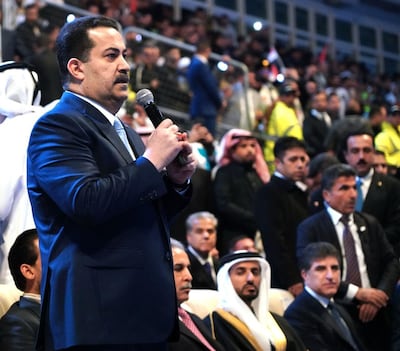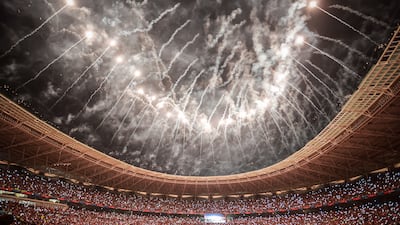The Gulf Cup began with fanfare on Friday in Iraq’s southern city of Basra, sparking hopes of a bright future for the country’s embattled football prospects.
For Iraqis, hosting the biennial event will turn a new page in the troubled history of their country, boost relations with Gulf neighbours and represent a crucial move towards full national recovery.
Iraqi Prime Minister Mohammed Shia Al Sudani formally kicked off the tournament, hailing it as a “historic moment” which demonstrates “brotherhood among the Arab brothers in the Gulf”.
“Dear sport fans, thanks for your presence,” he said. “On your behalf and in the name of Iraq, we welcome the brothers, the visitors, the teams and the fans in the land in Iraq, the land of Mesopotamia and Basra.
“We wish all teams success and enjoyment to the fans.”
Mr Al Sudani was joined by Fifa President Gianni Infantino, Iraq's Speaker of Parliament Muhammad Al Halbousi and the heads of the Gulf football federations.
As the sun set over the port city, the mood in and around Basra International Stadium was festive and electric with anticipation.
By the afternoon, more than 10,000 foreign fans had arrived in the city, located a short distance from Iraq's borders with Kuwait and Iran, an official from Basra's provincial government said.
Thousands of people gathered at the stadium, known as the Trunk of the Palm, its design inspired by the southern city's palm trees. It was filled to its 65,000-person capacity with more soaking up the atmosphere outside.
Some fans pushed the guards back at one gate, breaking into the stadium perimeter, but no large disruption was caused.
As the ceremony began, poet Hazim Jabir, actress Enas Talib, actor Jawad Al Shakarchi and singer Hussam Alrassam took to the field, dressed in elaborate costumes in a performance that told the story of the city’s rich history and culture.
Once the ceremony wrapped up, the tone in the stadium shifted from excitement to intense focus as Iraq and Oman faced off in the first game of the tournament.

Travel to the stadium before the ceremony and opening matches snarled up traffic in the city. Others walked to the stadium, waving the Iraqi flag or wrapping it around their shoulders. Songs welcoming the participating teams blared from cars.
Those who couldn’t secure tickets packed the public square to see the opening ceremony on a big screen.
“Thank God the opening ceremony was very beautiful and well organised; I didn’t expect that, to be honest,” Ali Ibrahim told The National as he joined hundreds of fans in the city’s Tayaran Square.
Mr Ibrahim, 23, and his cousin were draped in the Iraqi flag.
“We are very proud of our Basra, which has become an international city now,” he said.
“It is really amazing to see the tournament eventually kicked off after waiting so many years,” Dhirgham Amir told The National.
Mr Amir, 20, came with his brother and sister to Al Tayaran Square.
“This will definitely change how Iraq looks like to the whole world as a dangerous place ravaged with terrorism,” he said, putting his nine-year old sister on his shoulders.
“A bright future mainly in sport is waiting Iraq,” he added.
The biennial Arabian Gulf Cup first took place in 1970. The last time it was held in Iraq was in 1979, when the hosts were crowned champions. Iraq also won in 1984 and 1988.
The event features teams from the Gulf Co-operation Council countries — Kuwait, Saudi Arabia, Bahrain, Oman, Qatar and UAE — as well as Iraq and Yemen.
The most recent event was held in 2019 in Qatar and was won by Bahrain.
A bright future
“It is a step forward to retain Iraq’s normal position in the fields of sport, culture and society,” Basra Governor Asaad Al Eidani said before the start of the tournament. “It is a message to the whole world that we are capable.”
The UN Assistance Mission for Iraq echoed those sentiments.
“By hosting the cup, Iraq showcases the unifying power of sports and its ability to harbour peaceful and respectful competition. We wish Iraq and its people a successful tournament,” the agency wrote on Twitter.
The eight teams playing in the tournament are divided into two groups.
Group A consists of Iraq, Saudi Arabia, Oman and Yemen, while Group B features the UAE, Bahrain, Kuwait and Qatar.
The winners and runners-up of each group proceed to the semi-finals on January 16 — where the winners of Group A play the runners-up of Group B, and the Group B winners take on the runners-up from Group A.
On January 19, the winners of the semi-finals meet in the Gulf Cup final.


















